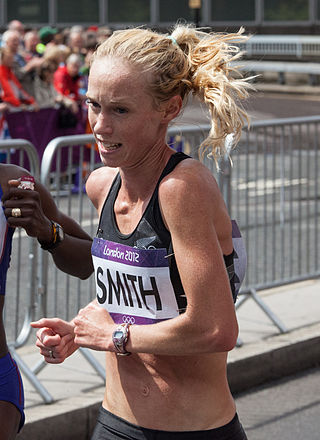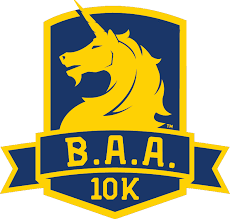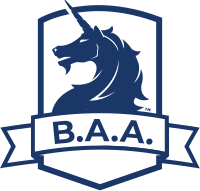
The Boston Marathon is an annual marathon race hosted by several cities and towns in greater Boston in eastern Massachusetts, United States. It is traditionally held on Patriots' Day, the third Monday of April. Begun in 1897, the event was inspired by the success of the first marathon competition in the 1896 Summer Olympics. The Boston Marathon is the world's oldest annual marathon and ranks as one of the world's best-known road racing events. It is one of six World Marathon Majors. Its course runs from Hopkinton in southern Middlesex County to Copley Square in Boston.

Hopkinton is a town in Middlesex County, Massachusetts, United States, 25 miles (40 km) west of Boston. The town is best known as the starting point of the Boston Marathon, held annually on Patriots' Day each April, and as the headquarters for the Dell EMC corporation.

Walter Augustine Brown was an American sports executive. He was the founder and original owner of the Boston Celtics, operated the Boston Garden-Arena Corporation, and served as president of the Boston Athletic Association. In ice hockey, he coached the Boston Olympics to five Eastern Hockey League championships, owned the Boston Bruins, and served as president of the International Ice Hockey Federation. He was inducted into the Hockey Hall of Fame in 1962, the Naismith Memorial Basketball Hall of Fame in 1965, and IIHF Hall of Fame in 1997.
Jon Willis ("Jack") Fultz is a retired American long-distance runner, who came to prominence in the 1970s after winning the 1976 Boston Marathon, the world's oldest and most established marathon race.

Kimberley Smith is a New Zealand middle-distance and long-distance runner who retired in 2016.

Kathrine Virginia Switzer is an American marathon runner, author, and television commentator.

George Vincent Brown of Hopkinton, Massachusetts, was an American sports official. He championed the development of various sports and sporting events in the United States, most notably the Boston Marathon and amateur ice hockey. From 1904 to 1936, Brown served the United States Olympic Team as a manager, official, and coach. In 1919, he became general manager of the Boston Arena, home to indoor track meets, boxing matches, and hockey games, among other events.
Elisha Kipkoech Tanui-Tultul is a world-class runner at distance ranging from 1500 meters to the 24-hour ultra-marathon.

Roberta Louise Gibb is an American former runner who was the first woman to have run the entire Boston Marathon (1966). She is recognized by the Boston Athletic Association as the pre-sanctioned era women's winner in 1966, 1967, and 1968. At the Boston Marathon, the pre-sanctioned era comprised the years from 1966 through 1971, when women, who under AAU rules could not compete in the Men's Division, ran and finished the race. In 1996 the B.A.A. retroactively recognized as champions the women who finished first in the Pioneer Women's Division Marathon for the years 1966–1971.
The following outline is provided as an overview of and topical guide to running:
Samuel Alexander Mellor Jr. was an American long-distance runner who won the 1902 Boston Marathon and competed in the marathon at the 1904 Summer Olympics in St. Louis, Missouri.

The B.A.A. 10K is an annual road running event for men and women over 10 kilometers (6.2 mi) that takes place in June in Boston in the United States. A total of 3040 people finished the race at the inaugural edition.

Dave McGillivray is a U.S.-based road race director, entrepreneur, philanthropist, motivational speaker, author, and athlete.

Benjamin True is an American track and field and cross-country athlete, who competed for Dartmouth College and currently trains in Hanover, New Hampshire, while competing for Saucony and In the Arena. True was the top American at both the 2011 and 2013 IAAF World Cross Country Championships, as well as the 2011 USATF Road Running Circuit Champion, winning the 5 km and 10 km Road Championships along the way.
Thomas J. Kanaly was an American sports executive with the Boston Athletic Association and the Boston Garden-Arena Corporation.
Henry G. Lapham was an American investment banker, oilman, philatelist, philanthropist, and sportsman. He was the founding president of the Boston Garden-Arena Corporation and a major sports promoter in Boston during the 1920s and 1930s.
Joan Chelimo Melly is a Kenyan and Romanian female long-distance runner who competes in road running competitions. She is the 2018 Prague Half Marathon Champion and the winner of other prestigious road races such as Berlin Half Marathon, Boston 10K and Boston Half Marathon.

The 2018 Boston Marathon was the 122nd running of the Boston Athletic Association's Boston Marathon. It took place on Monday, April 16, 2018. The race was held in unusually cold weather at 39 °F (4 °C) with rain. Yuki Kawauchi won the men's foot race in 2:15:58 and Desiree Linden won the women's foot race in 2:39:54. The previous year's times were 2:09:37 and 2:21:52, respectively, reflecting the difficult running conditions this year. Wheelchair winners were Marcel Hug, 1:46:26, and Tatyana McFadden, 2:04:39.

The 2021 Boston Marathon was the 125th official running of the annual marathon race held in Boston, Massachusetts, and 123rd time it was run on course. It took place on October 11, 2021.
William Thomas Cloney was an American athletics administrator who was the race director of the Boston Marathon from 1946 to 1982 and president of the Boston Athletic Association from 1964 to 1982.












